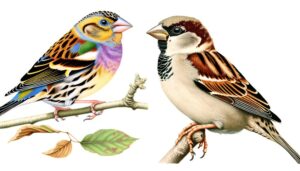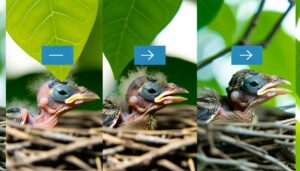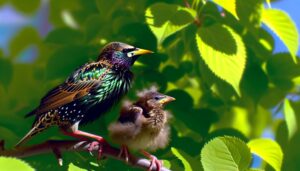Feeding Guide: How Many Mealworms Should You Feed a Baby Sparrow?
For a baby sparrow, start by feeding small portions of mealworms every 15-20 minutes during daylight. It's crucial to adjust quantities based on the sparrow's age; younger chicks need frequent, smaller meals, while older ones can handle larger, less frequent feedings.
Monitor the crop to avoid overfeeding—look for a moderately full crop and normal droppings. Mealworms provide essential protein and fat for growth, but don't rely solely on them.
A mix of other insects and small amounts of fruits or seeds ensures balanced nutrition. Follow these guidelines for peak health and growth.
To further understand the requirements, additional information awaits.
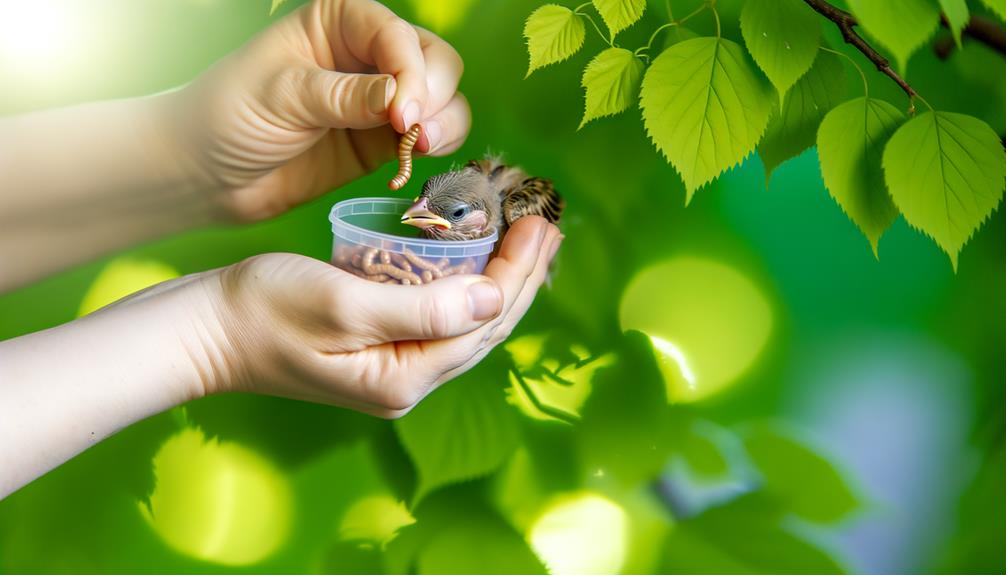
Key Takeaways
- Feed younger sparrows smaller portions every 15-20 minutes.
- Adjust mealworm quantity based on sparrow's age and size.
- Monitor the crop to ensure it's not overfull after feeding.
- Provide a mix of mealworms and other insects for balanced nutrition.
- Gradually decrease feeding frequency as the sparrow matures.
Understanding Baby Sparrow Diet
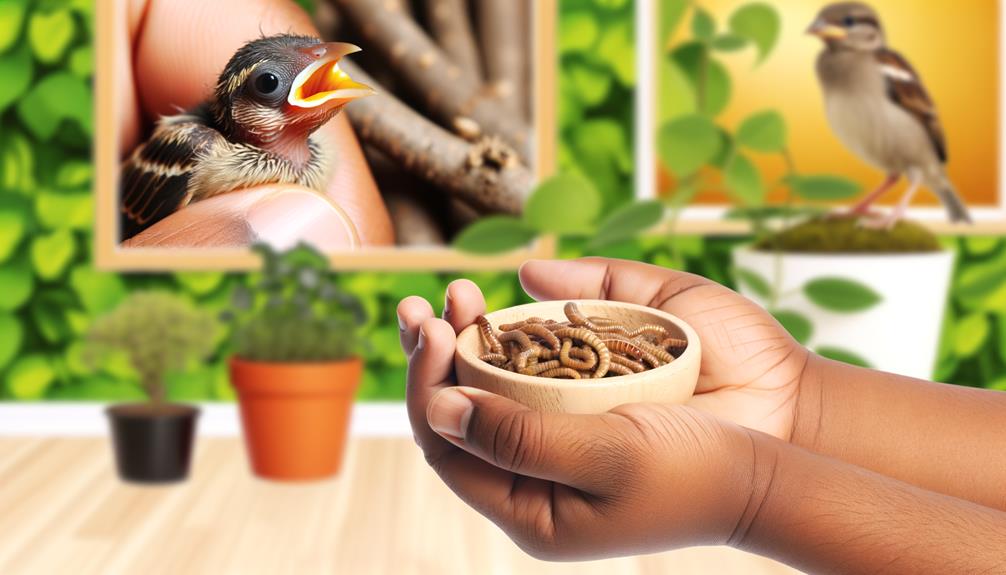
A baby sparrow's diet primarily consists of high-protein insects, such as mealworms, to support its rapid growth and development. You'll notice that these young birds have a higher metabolic rate, necessitating frequent feedings.
Observational studies indicate that baby sparrows require food every 15-20 minutes during daylight hours. High-protein diets guarantee that their skeletal and muscular systems develop correctly. You should also include a mix of other insects, like crickets and flies, for a balanced intake of nutrients.
Evidence suggests that mealworms are particularly beneficial due to their protein content and ease of digestion. By understanding and applying these dietary guidelines, you're contributing to the healthy growth and survival of these delicate creatures.
Nutritional Benefits of Mealworms
Mealworms, noted for their high protein content and ease of digestion, provide essential nutrients that bolster a baby sparrow's rapid growth and development. By integrating mealworms into their diet, you guarantee that these fledglings receive a balanced intake of crucial nutrients.
Scientific observations have demonstrated several key benefits:
- Protein: Essential for muscle development and overall growth.
- Fat: Supports energy levels necessary for active behavior and metabolism.
- Fiber: Aids in digestion, helping prevent gastrointestinal issues.
These elements make mealworms an excellent choice for baby sparrows. Evidence-based research confirms that the nutritional profile of mealworms aligns well with the dietary needs of young birds, ensuring they thrive during their critical developmental stages. This knowledge empowers you to provide the best care possible.
Age and Feeding Frequency
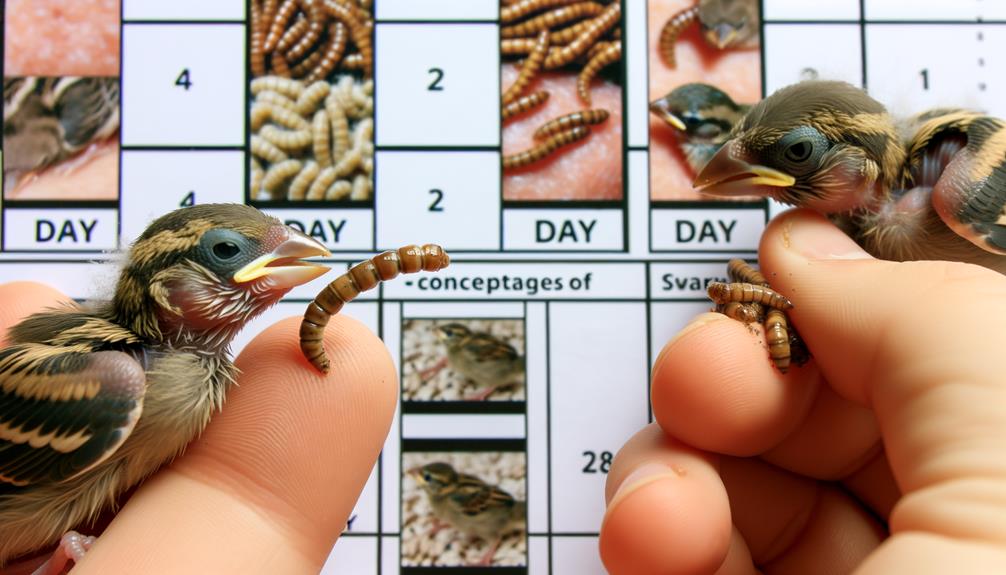
You'll need to adjust the feeding frequency and mealworm quantity based on the sparrow's age. For example, newly hatched sparrows require feeding every 15-20 minutes, while older nestlings can be fed every 30-60 minutes.
Evidence shows that younger sparrows benefit from smaller, more frequent meals to support rapid growth and development.
Feeding Frequency Guidelines
Feeding frequency for a baby sparrow depends on its age, with newly hatched chicks requiring nourishment every 15-20 minutes, gradually decreasing to once every hour as they grow older. Your dedication to precise, frequent feedings is vital for their development.
As they grow, observe their behavior and adjust accordingly.
- 0-1 week old: Feed every 15-20 minutes from dawn to dusk.
- 1-2 weeks old: Feed every 30-45 minutes as they develop more independence.
- 2-3 weeks old: Feed every hour, as they begin to self-regulate their intake.
Consistent feeding schedules guarantee they receive adequate nutrition and hydration, promoting healthy growth. By adhering to these guidelines, you're providing the necessary care for their thriving.
Age-Specific Mealworm Amount
When determining the appropriate amount of mealworms for a baby sparrow, consider the bird's age and its corresponding feeding frequency to achieve the best nutrition. Younger sparrows require more frequent feedings with smaller portions, while older ones need fewer, larger meals. Here's a detailed breakdown based on age:
| Age (Days) | Mealworms per Feeding |
|---|---|
| 1-5 | 1-2 small mealworms |
| 6-10 | 2-3 small mealworms |
| 11-15 | 3-4 medium mealworms |
| 16-20 | 4-5 medium mealworms |
Scientific observations indicate that adhering to these guidelines ensures optimal growth and development. By carefully adjusting the quantity and frequency, you'll provide the necessary nutrients for the baby sparrow's health and vitality.
Determining Mealworm Quantity
To determine the appropriate quantity of mealworms for a baby sparrow, consider the bird's age, weight, and nutritional needs.
First, assess the sparrow's developmental stage: hatchlings need smaller, more frequent feedings, while fledglings can handle larger quantities.
Second, weigh the bird to confirm you're providing the correct caloric intake. Studies indicate that a baby sparrow typically consumes 10-15% of its body weight in food daily.
- Age: Younger sparrows require more frequent but smaller feedings.
- Weight: Weigh the sparrow regularly to adjust mealworm portions accurately.
- Nutritional Needs: Balance mealworms with other nutrients to prevent deficiencies.
Prioritize these factors to ensure the baby sparrow receives the best nutrition for healthy growth.
Signs of Overfeeding
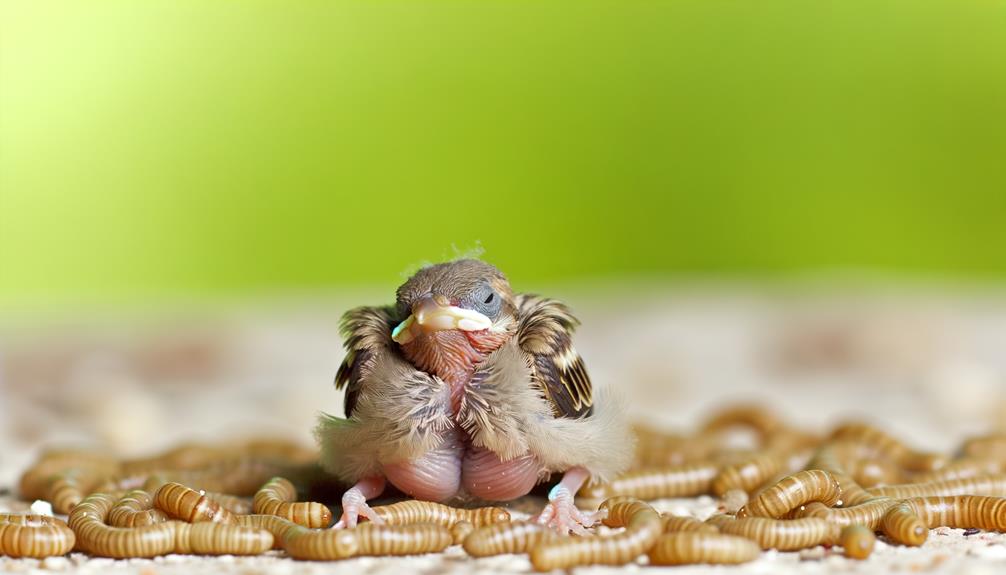
While ensuring appropriate nutrition for a baby sparrow is important, it's equally vital to recognize signs of overfeeding. Overfeeding can lead to various health issues, including obesity and digestive problems.
You should observe the baby sparrow's crop, which is a storage pouch in its throat. If the crop remains excessively full or distended long after feeding, it indicates overfeeding. Additionally, monitor the bird's droppings; watery or excessively frequent droppings can signal excessive food intake.
Behavioral changes, such as lethargy or reduced interest in feeding, are also warning signs. Be attentive to these signs to help the baby sparrow maintain optimal health, balancing nutrition without excess.
This careful observation helps you serve the bird's best interests effectively.
Signs of Underfeeding
A baby sparrow that isn't receiving enough food will exhibit clear signs of underfeeding, including a consistently empty crop and stunted growth. You'll notice these birds are lethargic and less active than their well-fed counterparts. Their feathers may also appear dull and patchy due to insufficient nutrients.
Look for the following signs:
- Weight loss: Regular weighing can help you track any concerning trends.
- Weakness: A malnourished sparrow will demonstrate decreased strength and struggle to perch or fly.
- Frequent begging: Persistent vocalizations and open-mouthed begging are strong indicators of hunger.
Document these observations carefully. Underfeeding can lead to severe developmental issues, so it's important to recognize and address these signs promptly. Your vigilance guarantees the well-being of these vulnerable creatures.
Alternative Food Options
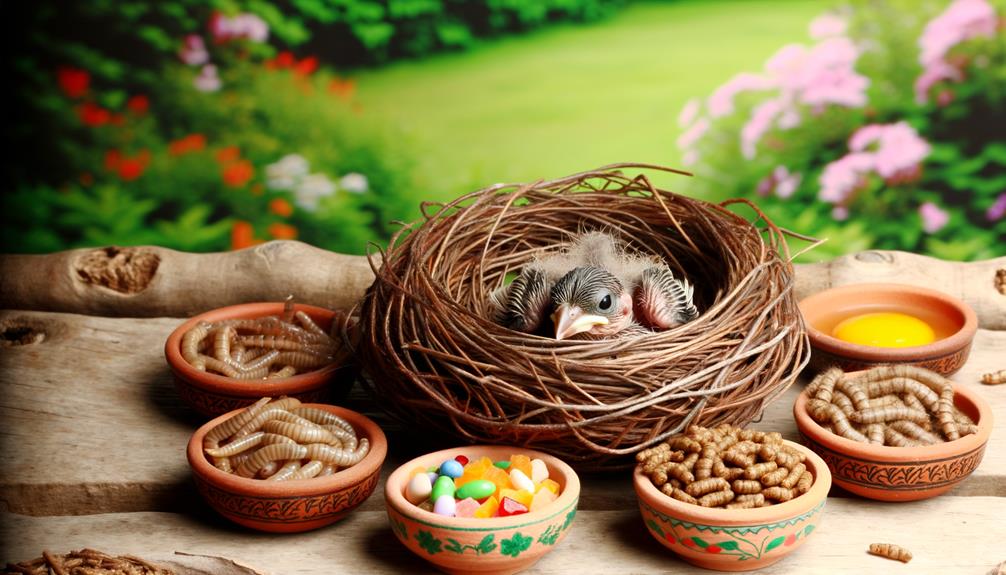
When feeding a baby sparrow, consider high-protein sources like boiled eggs or soaked cat kibble to guarantee proper growth.
Fresh fruits like apples or berries can provide essential vitamins, while hydration is vital, often supplemented with small amounts of water mixed into the food.
Additionally, powdered avian vitamins can be sprinkled on the food to support overall health.
High-Protein Sources
To explore high-protein sources like boiled eggs and soaked dog kibble is crucial, providing baby sparrows with necessary nutrients for their rapid growth. These alternative food options guarantee a balanced diet when mealworms aren't available. High-protein foods support muscle development and overall health.
Consider incorporating the following high-protein sources:
- Boiled Eggs: Abundant in proteins and easy to digest.
- Soaked Dog Kibble: Nutrient-rich and readily available.
- Insects: Crushed crickets and small caterpillars offer variety.
Scientific studies indicate that a varied diet improves fledgling survival rates.
By offering these alternative protein sources, you're guaranteeing the baby sparrow receives the best possible nutrition, aiding in its robust development.
Always observe the bird's response to new foods and adjust accordingly.
Fresh Fruits Variety
Fresh fruits like apples, berries, and grapes can provide essential vitamins and hydration, complementing the high-protein diet of a baby sparrow. You should dice these fruits into very small pieces to prevent choking hazards.
Scientific studies show that the natural sugars and antioxidants in berries boost the immune system, while apples offer fiber for digestive health. Grapes, rich in vitamins A and C, support overall growth and vitality.
Observational data indicate that sparrows readily accept these fruits when introduced gradually. It's vital to wash all fruits thoroughly to remove pesticides.
Hydration and Supplements
Ensuring proper hydration and providing essential supplements are pivotal components of a baby sparrow's diet, contributing to its overall health and development. Offer fresh water regularly, using a dropper or syringe to control intake. Dehydration can quickly become life-threatening, so monitor the sparrow's hydration status closely.
In addition to water, consider these supplements to promote optimal growth:
- Calcium supplements: Essential for bone development and preventing metabolic bone disease.
- Vitamins: Specifically, vitamin D3 to aid calcium absorption and general health.
- Probiotics: Support gut health and improve nutrient absorption.
These elements, combined with a balanced diet, will ensure the baby sparrow receives thorough nutrition.
Always consult with a wildlife rehabilitator or avian veterinarian for precise recommendations tailored to the sparrow's needs.
Tips for Feeding Baby Sparrows
When feeding baby sparrows, it's crucial to provide a balanced diet that includes a mix of protein-rich insects like mealworms and nutrient-dense seeds or grains. Mealworms offer high protein levels necessary for growth, but don't depend on them exclusively. Introduce finely crushed seeds and soft fruits to guarantee a variety of nutrients.
Feed every 15-20 minutes during daylight for newborns, gradually reducing the frequency as they age. Always observe the chick's crop to avoid overfeeding; it should appear full but not overstretched. Use sterilized feeding tools to minimize disease transmission.
Research shows that diverse diets contribute to healthier plumage and stronger immune systems, essential for the chick's survival and development.
Conclusion
Feeding a baby sparrow is like tending to a delicate garden; each element must be balanced for it to thrive. Just as overwatering can drown a plant, overfeeding mealworms can harm your feathered friend.
Conversely, underfeeding is like leaving a seed in barren soil. By observing your sparrow's health and growth carefully, adjusting mealworm quantities based on age and needs, you'll nurture it into a robust bird, mirroring nature's intricate balance.


